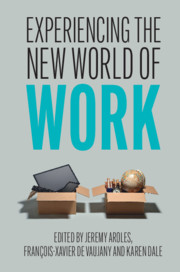Book contents
- Experiencing the New World of Work
- Experiencing the New World of Work
- Copyright page
- Contents
- Tables
- Contributors
- Foreword
- Introduction
- Part I Experiencing at Work
- Part II Digital Platforms and the New World of Work
- Part III Politics, Imaginaries and Others in the New World of Work
- 8 Bypassing the Stage of Copper Wire?
- 9 Critical Theory and the Post-work Imaginary
- 10 Exploring the New in Politics at Work
- Conclusion
- Afterword
- Index
- References
8 - Bypassing the Stage of Copper Wire?
New Work Practices amongst the Peasantry
from Part III - Politics, Imaginaries and Others in the New World of Work
Published online by Cambridge University Press: 24 December 2020
- Experiencing the New World of Work
- Experiencing the New World of Work
- Copyright page
- Contents
- Tables
- Contributors
- Foreword
- Introduction
- Part I Experiencing at Work
- Part II Digital Platforms and the New World of Work
- Part III Politics, Imaginaries and Others in the New World of Work
- 8 Bypassing the Stage of Copper Wire?
- 9 Critical Theory and the Post-work Imaginary
- 10 Exploring the New in Politics at Work
- Conclusion
- Afterword
- Index
- References
Summary
This chapter is about changes in work practices amongst the ‘peasantry’ still working upon the land in twenty-first-century India. This population may sound very far from the conventional understandings of shifts in technology that regularly affect how work is done in the ‘West’ but the rise of ICT technologies, especially the smart phone, have at least the potential to shift practices upon the land that have remained unchanged for centuries. Before the twenty-first century, large infrastructural requirements saw the triumph of copper so that in some senses a whole material civilisation developed around the electrical and conductive properties of this metal. However, this centralised mode of organising based upon copper has become threatened by a Digital Revolution. New forms of working are allowed by the post-copper technologies and materials of the twenty-first century but this chapter asks how widespread and how deep does this ‘rematerialising of organisation’ actually go?
- Type
- Chapter
- Information
- Experiencing the New World of Work , pp. 181 - 203Publisher: Cambridge University PressPrint publication year: 2021



